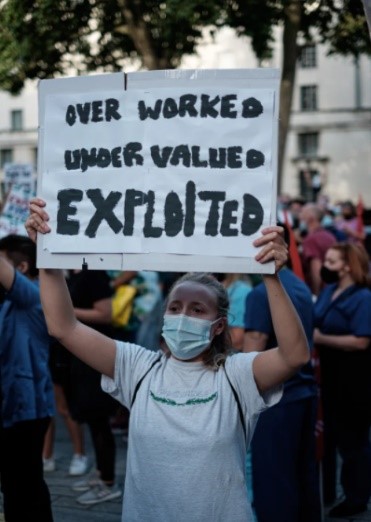Workers’ Stories in the COVID-19 Era: Installment #3
July 22, 2021
Written by Christina Love (Undergraduate Student, Indigenous Studies and French)
Edited by Suzanne Spiteri (PhD Candidate, Sociology)
In the third installment of the Workers’ Stories in the COVID-19 Era dialogue series, we interviewed a former front-line cashier supervisor who worked at a Shoppers Drug Mart in the GTA during the pandemic. In the dialogue below, Lucy describes her experiences dealing with employers and customers and her experiences of mistreatment and exploitation. Lucy’s story shows that COVID amplified the precarious working conditions faced by frontline workers.
For privacy, all names have been changed to protect the identities of our interviewees.
Interview
Christina: Can you just describe your job for me and how long you worked at your place of employment?
Lucy: I worked at my place of employment at Shoppers since August 2017. I started as a cashier. Within a year and a half, I was promoted to cashier supervisor. That basically meant my responsibilities were to supervise the team of employees during my shift, to deal with any customer issues, to count the safe, to be in charge of the all the money that comes in the store, and to count everything at night and make sure everything’s balanced.
Christina: Are you still employed with Shoppers Drug Mart?
Lucy: Currently, I’m not employed with Shoppers Drug Mart. I had initially decided to take some time off because of the COVID case spike and all the different variants. It was taking a huge toll on my mental health; it was very stressful to go into work to all these different people coming in not following guidelines, not wearing their masks properly, etc.
Plus, I had to study for a bunch of entrance exams, so I decided to take some time off and my manager said at the time that it was completely fine. But after around a week, my manager called me, and she said that the store manager told her that employees couldn’t take time off anymore.
Without consulting me, she took me out of the employee list, so if I wanted to come back to work, I’d have to apply all over again. I was shocked because out of nowhere I was just told that I was let go. There was no notice, and since I had no representation from a union, I couldn’t really fight it unless I wanted to get a lawyer, which I didn’t.
I was shocked because out of nowhere I was just told that I was let go.

I worked there since 2017. I had worked with these people for a very long time, and they did not care at all. I knew this workplace was very toxic, but I didn’t know that they would end up stooping so low.
Christina: How would you say that work changed for you during, or as a result of, the pandemic?
Lucy: It affected us quite a bit. Obviously, we had to wear masks and everything and extra protective gear which could be annoying, especially if we were wearing them for long periods of time. On top of that, there was a greater burden with sanitization, cleaning, and making sure that all the customers coming into the store were following proper regulations. It was all up to the existing employees; they didn’t hire more staff to help with any of this.
It was very stressful working during the pandemic with the cases rising and everything else. The management at my store was not competent at all and did not care about their employees. For example, if a customer came in not wearing a mask, or refused to wear a mask, we could not refuse service to them. We were told we could, but if we actually did, we would face consequences. That was a very big issue for me, personally, and a bunch of other people as well. It was clear that management and the owner only cared about making money. They did not care about our safety at all.
It was clear that management and the owner only cared about making money, they did not care about our safety at all.
Christina: Do you think that Shoppers generally handled things well in response to the pandemic?
Lucy: Generally, I think for the customers, everything was fine because everything was sanitized and taken care of from their standpoint. But for the employees, not at all. All the burden was placed on the employees who were below the manager. The manager basically just delegated to the cashiers. The cashiers were already the people who were most at risk since they had the highest contact with the public, and they just got buried under all this other work. From what I saw working there, the managers did not care about the workers.
Christina: Do you think that the employer treated you and your coworkers fairly?
Lucy: Not at all. So, the pharmacist owned the branch where I worked, and she was very discriminatory; she favoured the people who worked at the pharmacy more than any of the other employees in the store. For example, she got all of her pharmacy staff vaccinated in early January, and the rest of the staff…she never even talked about getting them vaccinated or discussed anything with them. The employer definitely did not treat us fairly at all.
Christina: You mentioned so many duties; do you think that you were fairly compensated for this? What was your raise as a cashier going into cashier supervisor?
Lucy: No. When I was working as a cashier, the increase I got when I was promoted to supervisor was only 10 cents per hour. That does not amount to anything in your paycheck; it’s basically no difference at all, but you’re given so many new responsibilities. We were not compensated well at all.
When I was working as a cashier, the increase I got when I was promoted to supervisor was only 10 cents per hour.
With the pandemic, we got a $2 addition to our hourly wage, but that only lasted for a few months before ending. However, the pandemic didn’t end, and their profits only increased, so there was no excuse for taking that away.

Christina: Have you voiced any of these issues to management and, if so, do you think that you were heard?
Lucy: I wouldn’t say that I went up to my managers or higher ups in the store explicitly to talk to them about my grievances because I generally just got the feeling that they didn’t really care. They were already aware of the problems I’m talking about, and they did nothing. They never advocated for employees, but they would bend over backwards for the customers. This was true even if it was a really small thing that happened in the store with a customer.
They never advocated for employees, but they would bend over backwards for the customers.
I remember one time—it was when the first lockdown started, and there were restrictions on how much stuff people could buy (toilet paper, Lysol, etc.)—this customer came in and she asked me for a rain check for a paper towel that we didn’t have. I couldn’t give her a rain check for more than one item because of the restrictions. So, I gave her the rain check for the one item, and she was horribly rude to me. She swore at me, and she said a lot of very inappropriate stuff. During her tirade, she yelled that she could go to Walmart to get it, and I told her to please go to Walmart and don’t come back here, because I was that frustrated. I usually never talk back to a customer like that. When I talked to the store manager about this incident, he just told me that I shouldn’t have said anything. He said I should have just taken her abuse and let it go.
Don’t we have any self respect? Sure, you work in a customer service environment, but that doesn’t mean that you should tolerate someone who’s using you as a verbal punching bag. It’s not fair, and if you’re not allowed to say something, at the very least your manager should be standing up for you.
Don’t we have any self respect?
Christina: Were you able to walk away from people who were verbally assaulting you like this or were you encouraged to just stand there and take it most of the time?
Lucy: Most of the time I was just encouraged to stand there and take it, especially as a cashier supervisor. No matter how unreasonable the customers were, you were just encouraged to stand there, listen to whatever they say, not say anything back, and just smile and take it.
Christina: There’s a kind of a double whammy as well, because I noticed that a lot of people in these types of front-facing retail jobs are women, so they have to deal with one, unreasonable customers, and two, unreasonable customers being sexist.
Lucy: Yes, I’ve noticed that too, especially at my work, where all except one or two of the cashiers were women. Some customers can be very intimidating. I have had many customers who would get aggressive, and they would stand so close to me that I would have to ask them to back up, and they would not listen. Then you would get very creepy and inappropriate customers, and management would not do anything.
For example, there was a customer who was stalking one of my coworkers, and he would always come in and ask for her and when her shift would be and he would follow her to her car, and management didn’t do anything. She told the cashier manager, she told the store manager, and they didn’t ban him from the store, they didn’t do anything. That’s harassment and they didn’t take any actions against it because he was a ‘paying customer.’
[T]here was a customer who was stalking one of my coworkers, and he would always come in and ask for her and when her shift would be and he would follow her to her car, and management didn’t do anything.
Christina: How has your work experience specifically during the pandemic, but also generally as well, impacted your mental and physical health?
Lucy: I would say it has affected my mental health a lot. My physical health hasn’t really been affected because, as I said, I work part-time, so I didn’t get that many hours to begin with during the pandemic. But mental health for sure, especially like when you have a day that’s just filled with abusive customers with your employer not doing anything about it, even if you complain to them.
It really takes a toll on you. I would feel so anxious whenever I had to come into work as a supervisor, because I never knew what I would be dealing with. It’s incredibly unpredictable and you know that the shift or store manager is not going to have your back.
Christina: Were there any supports that you could access to help with this mental strain? I understand some jobs give you benefits like different health insurances and things; did you have that at your job?
Lucy: No, nothing at all. Since I was part time, I wasn’t given any benefits or any mechanisms to help me deal with the issues I was having that were caused by the job. They wouldn’t provide me with anything like that. Even when I went to talk to them, they wouldn’t really care, so why would they even give me anything if they didn’t care about me?
Christina: Were you unionized?
Lucy: No, we were not unionized. We tried to get unionized, but a lot of people in our store were scared they would lose their job, or they weren’t interested. It didn’t end up going through, but I would have loved to be unionized because of the benefits and everything.
I would have loved to be unionized…
Christina: What do you think unionization can help with?
Lucy: It can help with better pay per hour, which is huge. It can also help with insurance and benefits. It can help with a guaranteed number of weekly hours. Those are some of the things that immediately come to mind.
Christina: That sounds very precarious; I remember someone told me in a different retail job that they would get their schedules week by week too. Have you ever experienced that at all? Were you able to depend on anything for consistency?
Lucy: Not really, especially concerning the schedule. Sometimes, very rarely, it would be posted about two weeks in advance, but most of the time, it was weekly that they would update the schedule and put up the new schedule. And the hours were very unpredictable and unreliable because one week my manager would give me 10 hours, and the next week she would give me only 5 hours. This lack of consistency was exacerbated, especially during the pandemic, since I was part-time. They wouldn’t give me enough hours to make the money I needed, let alone pay an actual living wage. I’m a student. I’m not even like running the household, and I didn’t have enough at all. I was barely getting by.
Christina: Were you using your job mostly to pay for tuition? Why do you think that you sought out this job to begin with?
Lucy: Not for tuition, because I never made that much to begin with. It was mostly for my extra expenses like transit, buying textbooks, getting clothes—stuff like that, the basic necessities.

Christina: If those necessities were covered, do you think you would have still wanted to have this job? Say your textbooks were covered, tuition was covered, expenses were covered; or was this a job stemming from need?
Lucy: I think it was a job of necessity because, at the time, my parents did not have high paying jobs. They were just starting out in their new fields after moving to Canada. So, I did need a job and I think it was a necessity at the time.
Christina: Last question is, if you could change anything about your job, or work in Canada in general, what would you change? Additionally, if you could tell the public anything else that you haven’t mentioned in your interview, what would you tell them?
Lucy: Honestly, I believe that people should not be scared of forming unions. And that people should be taught, especially in school, about the benefits of unions. If you’re coming from high school, and potentially into your first job, you should know these things.
If you’re not knowledgeable about unionization and employment rights, you’re way less likely to actually want to form a union. There’s so much anti-union propaganda out there too, but unions help workers, and I think that everyone should be taught about the history of labour rights and activism.
There’s so much anti-union propaganda out there too, but unions help workers, and I think that everyone should be taught about the history of labour rights and activism.
The hourly rate, of course, I would change that and increase it to a living wage, one you could actually survive on if you’re working there full-time. I would also implement guaranteed hours for part-timers.
If I could tell the public anything, I would tell them that a lot of people don’t feel empathy towards the people working in retail. A lot of the time they would just come in to look for a fight or to vent their anger. So, I would say that people should generally be a lot more thoughtful and kinder to people working in customer service positions and know that the people working there are treated horribly by customers and by their employers. That’s all I can say, really.
Just because you work at a store does not mean that you’re part of that corporation. Most of the customers treat you like you’re part of the corporation, like you’re in on the pricing and you’re in on the profit and everything, and I’m like, “No, I’m just here to make my $14 an hour.”
